
by Editor | May 25, 2021 | Media, News
 New Delhi : Journalist associations on Saturday demanded strict action against Delhi Police personal involved in assault and molestation of journalists covering a protest by students and teachers of the Jawaharlal Nehru University (JNU).
New Delhi : Journalist associations on Saturday demanded strict action against Delhi Police personal involved in assault and molestation of journalists covering a protest by students and teachers of the Jawaharlal Nehru University (JNU).
In a letter to Delhi Police Commissioner Amulya Patnaik, the Press Club Of India, the Indian Women’s Press Corps, the Press Association and the Federation of Press Clubs in India said journalists were beaten and molested despite telling police that they are from the media.
Condemning the assault, the associations said two women journalists were roughed up; one of whom was intimidated and threatened by women police officers and even more shockingly, the other journalist was molested by Station House Officer Vidyadhar Singh. A third male journalist has his arm in a sling after being beaten up by policemen.
They said the journalists were physically assaulted as they tried to take pictures of the protest, while police snatched their equipment and did not return it.
“Despite repeated pleas that they were journalists and even furnishing their identity cards, they were not spared.
“We demand that strict action against the police persons involved and the registration of FIRs on the complaints of assault and molestation, both of which have been filed at the respective police stations,” the associations said.
On Friday, JNU teachers and students held a protest march demanding suspension of professor Atul Johri, accused of sexual harassment, and protesting against the removal of some department heads and a coordinator for not complying with the University’s new attendance rules.
As the hundreds of protesting students and teachers from the University marched towards Parliament, the Delhi Police undertook a baton charge and fired water canons on the agitators near the INA Market.
Delhi Police on Saturday tendered their “deepest apologies” for the attack on media personnel when police undertook a baton charge on protesting students, with a senior officer stressing that police did not intend to obstruct the media from doing its job.
—IANS

by Editor | May 25, 2021 | Interviews

Historian Romila Thapar
By Saket Suman,
New Delhi : As a globally renowned professional historian, she has in recent years been the target of vicious right wing trolls who are out to spread their own version of history. If it doesnt seem to overly bother her, it is because, unknown to most, Romila Thapars life has been one lived amidst sustained hate and criticism.
Thapar completed her PhD in 1958 from the University of London and returned to India in 1961 and joined Jawaharlal Nehru University (JNU), New Delhi, in 1970 as professor of Ancient Indian History (after brief stints at Kurukshetra University and the University of Delhi).
Just seven years after she joined JNU, her troubles began. In the late 1970s, several members in the Janata Party and the Morarji Desai government sought changes in textbooks. The books that were targeted by members of the Jan Sangh – which later morphed into the Bharatiya Janata Party (BJP) — included two significant works by Thapar: “Medieval India” written by her, and “Communalism and the Writing of Indian History”, which she wrote along with Harbans Mukhia and Bipan Chandra.
Those protesting against these books criticised Thapar for several reasons, primarily for going soft on Muslim rulers like Aurangzeb.
“I did not allow the text books written by me to be changed because every time they would want to make a change, I would say, yes go ahead and make a change, just take my name off the book. But they didn’t want to do that because they wanted the legitimacy of the name of a historian and yet they wanted to make the changes,” she told IANS in an interview.
Her troubles with the BJP did not end there. She was removed from the Indian Council of Historical Research (ICHR) less than three months after the BJP came to power in 1999.
Merely four years later, criticism hit her again when, in 2003, she was appointed as the Visiting Chair at the US Library of Congress. She was supposed to spend 10 months at the John W. Kluge Center researching “Historical Consciousness in Early India” — but a petition against her appointment described her as a “Marxist” and “anti-Hindu”, while emphasising that it was “a waste of US money to support a Leftist”.
“Within a month of my getting there to Washington, there was a long 15-page petition saying the most vicious things about me. Really, I mean, written by people after reading whom one could make out how paranoid they were. And I was terribly disturbed at that point of time because I thought, What do I do, I am sitting in Washington, I know nobody in the embassy, I know nobody in the Library of Congress; and I wondered how was I going to manage this attack,” she recalled.
The question that many of her critics raise is why she does not respond to them, claiming that she is scared of a public debate.
“Do I respond? Or do I just keep quiet? The problem with responding is that one would then have to respond each time somebody wrote against one. When I was facing all of this in Washington, a couple of senior academics in London wrote to me and said, ‘For god’s sake don’t respond, because that’s exactly what they want you to do.’ They will want you to spend all your time defending yourself on stupid issues whereas you should be doing serious research.
“And so I thought about it at great length and eventually I decided not to respond — and I haven’t for that reason, although they call me a coward, they say I am not willing to have a public debate and so on. And my attitude is that as an academic I am not into public debate: I write what I think is right, I give my evidence, I give my references, take it or leave it. I am not insisting that you follow what I am saying,” she maintained.
“I think the main point is the insistence that I have the right to research and write and give evidence for what I am saying and make my statement about the past. I think this is the right that everybody has, and why should I be denied that right which everybody has?” she asked.
She maintains that arguing a particular position in any discipline is a constitutional mandate as long as she sticks to the given methodology and substantiates her research with enough evidence. This is also where she makes a distinction between “academic history” and “fantasy history”. Fantasy history, she maintained, is written for public consumption.
“But I have been firm on the fact that as an academic historian, I will go on saying what I wish to say, on the basis of my research,” she said.
Meanwhile, Oxford University Press has published “The Historian and Her Craft: Collected Essays and Lectures” by Thapar. This set of four volumes, according to the publisher, reflects “the scholarship of one of the foremost historians of our time”. It is a comprehensive collection of lectures and essays by Thapar, with each focusing on a theme — Historiography, Pre-Mauryan and Mauryan India, Social and Cultural Transactions, and Religion and Society.
(Saket Suman can be contacted at saket.s@ians.in)
—IANS
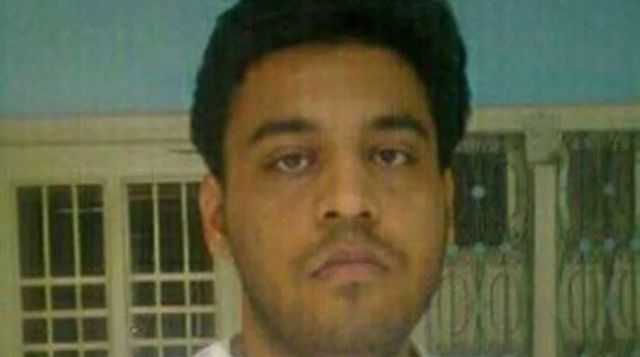
by Editor | May 25, 2021 | News, Politics

Najeeb Ahmed
New Delhi : A court on Tuesday rejected the CBI’s plea seeking consent for lie detection test of nine students in connection with the missing Jawaharlal Nehru University (JNU) student Najeeb Ahmed.
Ahmed, 27, an M.Sc First Year student, went missing on October 15 last year after an alleged fight with the members of the RSS-affiliated Akhil Bharatiya Vidyarthi Parishad (ABVP). The student body has denied any involvement.
Additional Chief Metropolitan Magistrate Samar Vishal observed that the students’ reply clearly reflects that they were opposing the application of polygraph test as they were not willing to go for lie detection test.
“Since a polygraph test cannot be done without the consent of the person whose polygraph test has to be done, this application, therefore, cannot be allowed at this stage,” the court said.
The court was hearing the Central Bureau of Investigation’s (CBI) plea for recording consent of the accused for a polygraph test in connection with Ahmed’s disappearance.
Student counsel Vishwa Bhushan Arya and Ujjawal Kumar told the court that as per the National Human Rights Commission (NHRC), the lie-detector test is not authorised by law and must be regarded as illegal unless it is voluntarily accepted.
The court pointed out NHRC guidelines which suggest that the test is prerogative of the individual, not an empowerment of police.
The counsel has requested the court to dismiss the plea terming it as pre-mature and not maintainable and said that summoning the students to record their consent or refusal is nothing but a coercive exercise.
The court directed the CBI not to call the students in future to seek their consent to undergo lie detection test.
It, however, granted liberty to students to opt to volunteer for the polygraph test whenever they feel convenient and directed the CBI to conduct the test following all safeguards under the NHRC guidelines.
—IANS
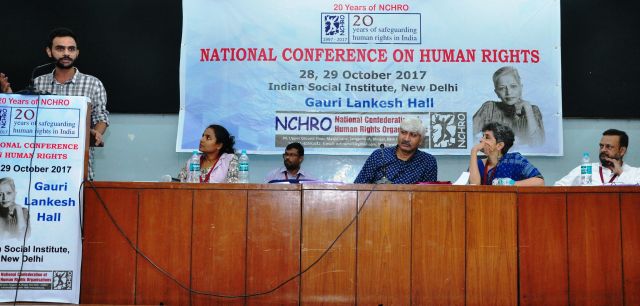
by Editor | May 25, 2021 | News, Politics

Student leader Umar Khalid addressing the NCHRO National Conference in New Delhi while seen seated on the dais are (from left to right) Padmashree, Adv. A. Mohammed Yusuff, Prof. Apoorvanand, Prof. Nivedita Menon and Syed Zubair Ahmed.
By Pervez Bari,
New Delhi : Prof. Nivedita Menon of Jawaharlal Nehru University, (JNU), has said that the RSS is trying to change the social and cultural ambience of the universities. The new Vice Chancellors appointed by the NDA government try to introduce the culture of “Rashtravaad” through fair or fouls means with the help of the ministers concerned.
Prof. Nivedita made the above observation while delivering her keynote address in the opening session on the second day of the two-day (October 28 & 29, 2017) National Conference on Human Rights organized by National Confederation of Human Rights Organizations, (NCHRO). The sessions were held in the Gauri Lankesh Hall, at Indian Social Institute, New Delhi. Prof. Apoorvanand of Delhi University, (DU). chaired the first session on “Universities and Academic Freedom”. Ms Padmashree, Joint Secretary of NCHRO, Karnataka Chapter, welcomed the gathering.
Umar Khalid, the eminent student leader from JNU Delhi, underlined the need for new student politics different from the traditional left.

Veteran journalist V.T. Rajshekar addressing the NCHRO’s National Conference in New Delhi.
While Syed Zubair Ahmed, Editor-in-chief of web news portal www.muslimmirror.com, putting forth his views on the topic said: “A university is the place where fascism gets tough resistance, that’s why universities are the main target of fascist forces. When there was no opposition to the RSS controlled BJP government, the main opposition party Congress was nowhere in the scenario and was on ‘watch and wait’ mode. It was JNU, its students and faculty members who were playing the active role of opposition and countering the fascist regime tooth and nail”.
The chairperson of the NCHRO Prof. A. Marx presided over the second session “Victims of Rights Violations and Activist Meet’’. It was inaugurated by eminent journalist, Editor of Dalit Voice V.T. Rajshekar. “We are meeting here today in a very dangerous of political climate. Brahmanism is the enemy of the country. Muslims are not foreigners. Dalit-Muslim unity is need of the hour. Muslim leadership should initiate this task” he said. Adv. Shakeel Ahmed, National Executive Member, NCHRO also spoke.
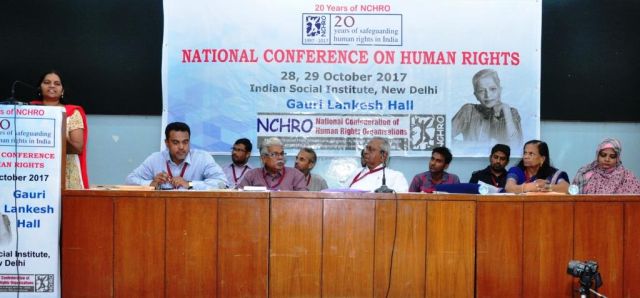
Mrs. Vasantha Saibaba, wife of Delhi University’s jailed Prof. G. N. Saibaba, addressing the NCHRO’s National Conference in New Delhi.
The victims of rights violations, Mrs. Vasantha Saibaba, the wife of Dr G.N. Saibaba, who is currently in Nagpur Central Jail; Amanullah Ansari, Kota, Rajasthan; Zakir Thyagi, Muzaffarnagar, UP; Dr. Kusum Megwal, Udaipur Rajasthan; Irshad Ali, Delhi; Mohammed Elyas, Baran, Rajasthan, Sadaf Mushrraf. (Sister of missing JNU student Najeeb), Delhi shared their pain with the participants.
The activists’ session under the banner “Rights in the Modern World and the Problems of Appropriation” focused on the need for better legal and political coordination among different rights bodies.
The documentary on Dr. Hadiya issue (Kerala) titled “I am Hadiya” produced by noted film maker Gopal Menon was symbolically released on the second day of the conference.
Adv. K. P. Mohammed Shareef, Vice Chairperson of NCHRO, chaired the valedictory session. Adv. Amit Srivastav, State Vice-President, NCHRO, Delhi Chapter; delivered welcome address.
Muhammed Ali Jinnah, General Secretary, Popular Front of India, speaking on the occasion said that we live in a phase, wherein undeclared emergency is in place and notable writers and thinkers like Dabolkar, Pansare, Kalburgi and Gauri Lankesh were shot to death. Muslims and Dalits are being lynched for eating the food of their choice. At this juncture there is a need to fight for Human Rights and justice. As a human being, who has to be true to his conscience and safeguard the justice, it’s the right time for every Indian to take a right decision. In that way, we have to congratulate NCHRO, which works tirelessly in the human rights front, he said.
Jinnah said the Indian Constitution is a beacon, comparatively. But it is used to arrest the people instead of safeguarding them. Muslims, Dalits and Tribals are affected the most. The condition of Muslims is pathetic. The community which is denied reservation in all the fields is provided reservation in the jails, well above the mark. The Muslims who constitute 14.2% of the population constitute more than 30% in the prisons. The Muslims who spend 8 years, 10 years and 14 years in the jails are later acquitted as innocent by the courts. Why were they sentenced? Who will return their youth and dignity? Who will answer the questions of these hundreds of youth in this democratic nation? What will be our role in this case?, he questioned.
The right wing fascists who are in power are now targeting the anti-fascists, those who have difference of opinion and those who fight for Human Rights. What will be our role against this fascist witch-hunt?
The Government has got a draconian weapon called UAPA to murder the Human Rights. The manner in which UAPA has been implemented shows its dangers. Moreover the Government is using this act to portray the Muslim majority areas as the dens of terrorism. What can we do for this?
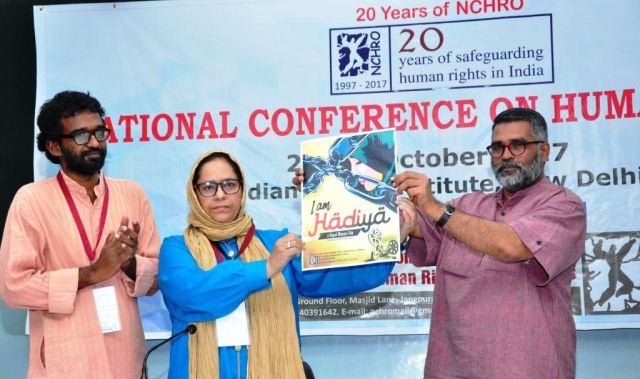
Reny Ayline, Secretary NCHRO; looks on as Ms Anjum Zamrud Habib, Writer & Activist, Kashmir; and Vilayodi Shivankutty, Kerala Chapter President, NCHRO release the poster of documentary titled “I am Hadiya” produced by noted film maker Gopal Menon in New Delhi.
Hence, the call for human rights should be echoed across the nation and it’s the need of the hour. The true spirit of our Constitution can be restored only if we fight effectively for the Human Rights. Let the NCHRO, which has 20 years experience in the human rights field guide the nation in the journey for human rights, Jinnah appealed.
Prof. A. Marx, Chairperson of NCHRO, Prof. P. Koya, General Secretary, NCHRO; also spoke in the valedictory session.
Meanwhile, fifteen resolutions on different issues were passed in the conference. Ansar Indori, State General Secretary, NCHRO, Delhi chapter; proposed the vote of thanks.
The activists from 18 states viz. Kerala, Tamil Nadu, Pondicherry, Karnataka, Andhra Pradesh, Telangana, Maharashtra, Goa, Madhya Pradesh, Rajasthan, Haryana, Delhi, Jammu & Kashmir, Uttar Pradesh, Bihar, Odisha, West Bengal and Assam participated in the conference.
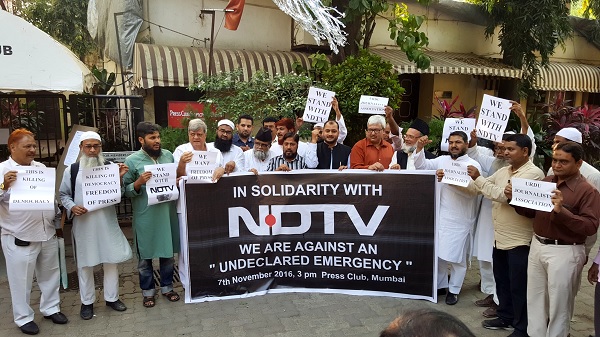
by Editor | May 25, 2021 | Opinions

By Ram Puniyani
The decision to put a one day ban on Hindi NDTV, since withheld, came as a big jolt to the country. A major channel was asked to stop the broadcast. The charge was that its broadcast on Pathannkot revealed sensitive information regarding national security. On the same Pathankot issue this Government had allowed the Pakistan authorities to come to the same airport. The channel (Hindi NDTV) pleaded that its program was very balanced and nothing related to national security was relayed which was not on the public domain through other media. It is clear that NDTV Hindi in particular has been debating issues which are uncomfortable to this Government. Apparently the pressure of all round protests forced the Government to hold its decision for time being. The issue of Bharat mata ki jai, nationalism, the issues related to JNU and Hyderabad Central University (HCU), Una in particular, were debated in ways which critical of the ruling party.
Since this dispensation, Modi Sarkar, has come to power there is a qualitative change in the political scenario. Right at the beginning we witnessed many attacks on Churches. We saw the interference in the institutions of national importance like FTII, IITs, JNU and HCU among others. The incompetent persons with ‘right wing’ leaning were installed and have been brought in at most of these. The places of learning are a special target. The JNU was targeted labeling it as the den of anti nationals. A cooked up video was used to defame the student leaders of JNU, in HCU Rohith Vemula had to commit suicide. The growing intolerance led to returning of awards by luminaries of our society. The issue of beef was blown up to the sky; the emotive hysterical projections were propped up leading to the death of Mohammad Akhlaq, many other traders and later the dastardly attack on the dalits in Una in Gujarat. Many sections of media have been brow beating the liberals and secular elements while giving a free run to Hindu nationalists.
It is in this backdrop that the Bhopal encounter has taken place where eight Muslim youth alleged to be terrorists were killed in an extra judicial manner. The incident as it has been presented clearly shows that the version of the police has lots of holes in it. In JNU again one student Najeeb has been missing for last three weeks and his mother was manhandled by the police. Is it mere emergency, where such blatant violations of human and democratic rights are taking place? Emergency was a condemnable authoritarian regime where from the top a dictatorship was imposed. press censorship was brought in. Surely the present times are having lot of difference.
To begin with the dominance of corporate and doing away of the rights of workers and farmers along with undermining the schemes like MNREGA, Right to Food, Right to Health and Right to education show that the orientation of this Government is to ally with the big capital. The complimentary part of this phenomenon is the promotion of Hindu nationalism. Right from the word go; the sentence, ‘I am nationalist and I am born in a Hindu family’ by Modi set the tone of shape of things to come. With this the targeting of minorities, on the issue of Uniform Civil Code and beef is there. The ultra-nationalism is manifest in the handling of Kashmir and relations with Pakistan in particular. The use of Uri and consequent surgical strike to bloat the chest of this political dispensation is very much in the air. The permission of thousands of NGOs working in the social sector has been stopped on frivolous grounds. The attack on Pakistani artists is another instance where the sectarian nationalism is having an unrepentant march. It is to be remembered that we have a bilateral trade to the tune of thousands of crores with Pakistan. With China similar sentiments have been flashed by talking about boycott of Chinese goods, despite the fact that the contract of proposed Saradar Patel statue running in to thousands of crores has been given to China. The popular sentiments are being guided into negativity and hate towards neighboring countries, religious minorities and the human rights activists.
The stifling of democratic freedoms, welfare of the poor, the intimidation of minorities and human rights defenders is running parallel to the creation of mass hysteria and mobilization of masses to uphold the agenda of ruling party. Those questioning the state are being put in the dock. In a democracy it the state which is answerable to the people. Now this formula is being reversed. In democracy questioning the authorities is the bedrock of the Constitution. So something is seriously amiss, something which is more sinister than the emergency. Something which has deeper portents for the democracy is being legitimized and glorified by the ruling party and the parent organization of the ruling party.
So how does one characterize it is the matter not of mere academic concern. Recently CPM leader Prakash Karat had stated that the present dispensation is mere authoritarian and not fascist. The distinction between two has been a matter of historical debate. The main features of fascism has been centrality of state over people, overarching Leader, dominance of Corporate, doing away with rights of poor, targeting of minorities, ultra nationalism and aggressive policies towards the neighbors. The crucial point for those wanting to preserve the democracy and Indian Constitution is to build up social and political alliances, irrespective of some differences, to fight this raging politics of Hate, politics of sectarian nationalism.
During 1990s, BJP did project itself as a ‘Party with a Difference’, and that is so much true. It is the only party whose agenda is guided by the Hindu nationalist RSS, which rejects democracy and secularism as Western imports and wants to stick to the laws of Hindu Holy Scriptures. These scriptures are the same, one of which was burnt by Ambedkar as a mark of protest against its values of caste and gender hierarchy, values of Brahminism. Debates can continue but politics to defend Indian Constitution cannot wait!

 New Delhi : Journalist associations on Saturday demanded strict action against Delhi Police personal involved in assault and molestation of journalists covering a protest by students and teachers of the Jawaharlal Nehru University (JNU).
New Delhi : Journalist associations on Saturday demanded strict action against Delhi Police personal involved in assault and molestation of journalists covering a protest by students and teachers of the Jawaharlal Nehru University (JNU).






